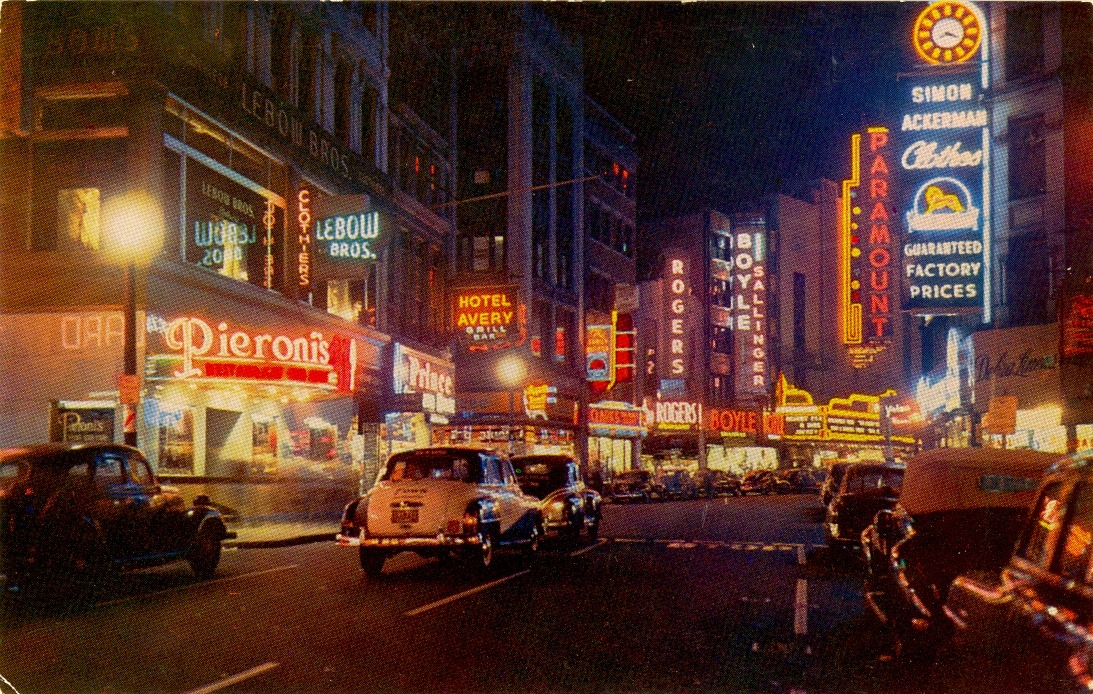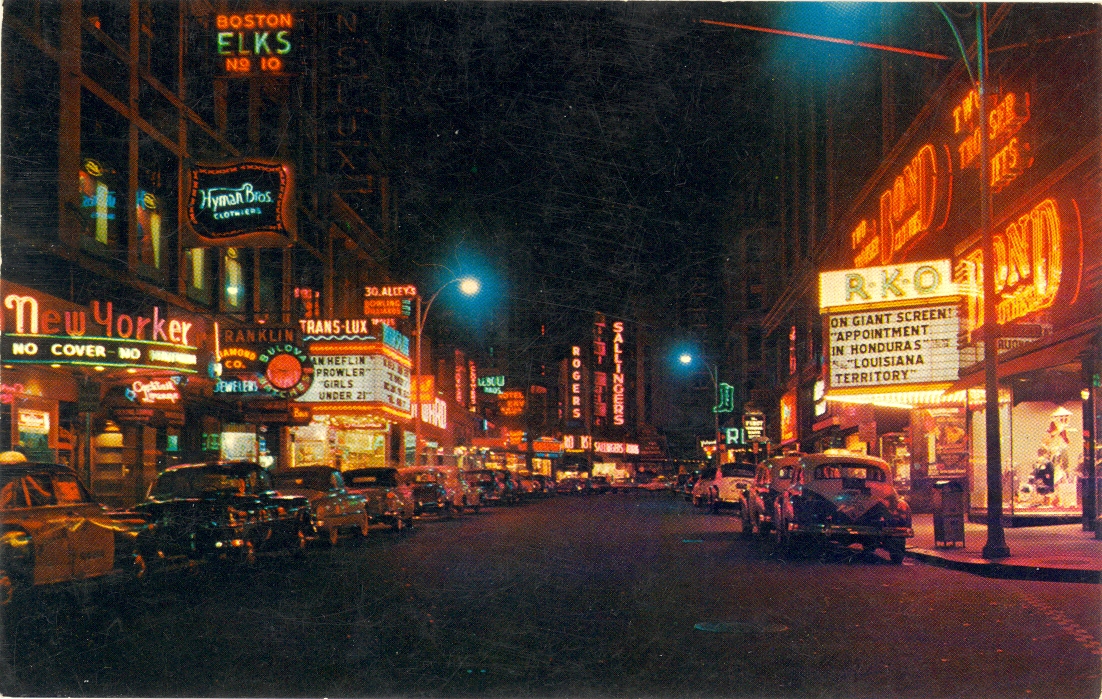
The old Italian laborers in the North End used to have a saying when they came home exhausted from ten hours of backbreaking work; “fatica poots” meaning work stinks, and for them it did, but finding a job was essential and the main reason they emigrated to America. Today, we’re going to look at how jobs have evolved in and around the North End.
The two photos I’m sharing today are of Washington Street around 1953. While not actually part of the North End, Washington Street is contiguous with our neighborhood. It was so much a part of our work and social life I thought it would make an interesting article.
Preservation Massachusetts has just designated the “Ladder District” with its nineteenth century buildings as one of the most endangered historic resources. In the 1970’s, suburban shopping malls began drawing people out of the city and downtown languished. That entire area between Washington and Tremont streets is now being re-invented as high tech startup companies move in. The streets are alive again with coffee shops, small restaurants and hordes of people moving about.

These post cards illustrate the part of Washington Street near Kneeland Street, the boarder of Chinatown and the garment district. Notice the street activity and the scale of the area. There were restaurants, clothing stores and old Vaudeville theatres recycled to show movies, all lit up with neon signage. This was our Times Square and everyone went there to work, shop, dine and meet their friends.
Today, we have the Ritz Carlton hotel and condominiums, the Millennium Tower and more high rises on the way. These vertical gated communities are fine as long as you live there, but they become self-contained neighborhoods and isolate wealthy people from the activity on the streets.
A few weeks ago, I was speaking with my uncle about the changes he has seen in the North End during his ninety five years living here. He mentioned several things we already know; the exodus to the suburbs, urban renewal, gentrification, the diminishing influence of the Catholic Church and organized crime and the tremendous influx of tourists. “But, you know, Nicky” he said, “for me the biggest change of all is the lack of (blue collar) jobs. When I was young, a North End kid could graduate high school and easily get a good paying job within walking distance or a short trolley ride from home.”
My mother was one of eight children in a typical North End family. Her parents were immigrants who came to this country in the late nineteenth century and lived first on Prince Street and then on Salem Street. Neither one spoke much English. Her father was a barber and all the children were educated in the Boston Public Schools, none went to college. Here is a list of the jobs they had;
- The eldest, Louisa, worked for the State as a social worker and two nights a week in Filene’s Basement.
- My mother Emilia (Emily) was secretary to Frank L. Havey, the director of the North End Union settlement house.
- Aurora was a candy dipper (first rule, never lick your fingers) at Deran’s near North Station.
- Christina (Tina) was a stitcher in a clothing factory on Kneeland Street.
- Emidio (Mimmie) worked for the Veteran’s Administration when he got home from WW II.
- Norma was a sales girl at R. H. Stern’s on Tremont St, a wonderful department store where the elevator operators wore white gloves and there was a “notions” counter on the first floor.
- Alexander (Yankee) worked as a fish cutter at the Globe Fish Co. and then as a truck mechanic.
- Barbara (Dolly) was a clerk at Liberty Mutual Life Insurance Company.
Anonymous jobs for anonymous people but there was food on the table every night.
Every week they would cash their checks and give the money to my grandmother who kept it in a coffee tin over the sink. She would pay all the bills and give them each an allowance. As adults, the two boys got to keep all their pay but the girls continued receiving an allowance until well into their twenties.
The North End was surrounded by businesses that needed low wage workers. The fish markets along Atlantic Ave, the candy factories, the dry goods and hardware stores on Union Street, the garment factories on Kneeland Street, the department stores and so many others all needed workers which the North End and other neighborhoods provided. As wave after wave of immigrants came ashore in Boston the North End was their gateway to the new world, a place where they could find cheap shelter and a job. Every generation of residents reinvents the North End to reflect its own culture and desires and we see this happening today. Where we once had butchers, greengrocers and funeral homes we now have yoga studios, restaurants, boutiques and coffee shops. I think this is a positive development and a characteristic of a healthy, ever evolving neighborhood.
Seventy five years ago when my aunts and uncles walked to work they wore fedora hats, cloth coats and sensible shoes. Now, I see young North Enders going to work wearing yoga tights, flip flops and man buns. Times change, but as they walk to their new economy jobs I hope North Enders will remember the generations of workers who preceded them. The jobs and the clothes are different but the North End is still a great place to live.
Nicholas Dello Russo is a lifelong North Ender and columnist. Often using vintage photographs, Nick tells the stories of growing up in the North End along with its culture and traditions. It was a time when the apartments were so small that residents were always on the streets enjoying “Life on the Corner.” Read more of Nick’s columns.




Nick, I enjoyed your article. It brought back memories of my grandmother Carmella Sacco. She worked at Derans also. She would bring home slabs of seconds chocolate and various other treats for her grandchildren. To this day I am addicted to chocolate!
I think I met your grandmother when I was about ten years old, Joyce. She was one of my aunt’s best friends. They sat next to each other at the Derans dipping line. I think they gossiped all day long.She came to visit us on Salem St. with her daughter who I thought was beautiful. Carmella had a wonderful, outgoing personality. Always smiling and laughing.
The area just beyond the 2nd photo was known as “the Combat Zone” & that place was a story in itself,
Nick, you brought tears to my eyes! It was probably my aunt Josephine. She was was the prettiest of the four daughters. My family lived at 5 Jackson Ave. Your name was always familiar to me. Perhaps you knew my other relatives, the Piazza family and Tranghese. Keep these great articles coming!
Interesting article once again Dr. Sad to say but true the laborers were exploited back then they would gather near the union hall and a few were chosen to go to different job sites,the ones who folded a five dollar bill into a book of matches and handed it to the Man went to work!!!!!
Great article Nick, it brought back many memories,My Mother also worked at the Chocolate factory, and you mentioned Kneeland St, where I open first Restaurant, called Charles Lunch at 43 Kneeland st, I was 21 years old then, Great Pic of Washington st.
Bobby Church
It helped if you knew someone & had an “in” who was part of the Laborer Union.I had a childhood friend named Danny who could put you to work on the spot.My first experience was to go up to the Union hall where there were dozens of guys waiting for work.I had a friend of mine with me who like me needed to get a job or spend some time at Deer Island.There were a couple of guys wearing Cashmere topcoats & Sharkskin suits who I found out were “Union reps”even though we were not members of the Union & did not have a Union card we were picked to work over members because the fix was in.They sent us up to what was the Old Scolly Square area and to a work site that I think became the JFK building.The foreman was an older guy with a stogie hanging out of his mouth who taught us the ropes of construction work. We were working hard trying to make an impression when I heard the foreman yell “hey you come over here” I didn’t know what I did wrong & why he was so upset. He said to me “kid what are you trying to do kill the job” After that I knew how construction was done in Boston.
I knew Danny very well, Michael. We hung around every so often in front of BeeGee’s on Prince St. Danny was a tough kid with a lot of street smarts.
When we were about seventeen years old I went off to college and Danny went to work as a laborer. I hadn’t see him for at least twenty years when I ran into him dressed in a sharp suit getting out of a beautiful new Cadillac on State St. “Wow, Danny”, I said, “nice set of wheels, what have you been up to?” He told me he was a steward in the laborer’s union. Danny passed away a few years ago.
Nick, one of my fondest memories of Danny was helping ,Danny his father & brother in law make make home made wine in the cellar of 56 Prince St.We would turn an iron bar on the press that squeezed the grapes.Whenever I saw him he would always ask me that if I ever needed a job to go up to the Union on Hanover St. over the Post Office .In BeeGee’s he had an uncanny gift to hit the DD from NY.The telephone would wring BeeGee would pick up the receiver & write down the results on his Armstrong racing form and yell out “Danny limit double” He was a good guy & a good friend.
Reading this, I couldn’t help but think “Coulda been my family.”. Seemed like they worked twice as hard, but complained very little (at least not to my ears). But then again, I have never experienced anything like the Depression or (no war is a picnic) WWII. A much more grateful people then.
Nick – My grandmother Colomba Moscaritolo worked at the candy factory. Her fore lady was Tillie. I would visit her with my cousin’s and she would show us off. I lived in Roslindale on the second floor over my grandparents and my grandmother would take up milk chocolate for us to enjoy. This is only one piece of my wonderful life of growing up Italian. Thank you for your articles Nick. Joe Moscaritolo